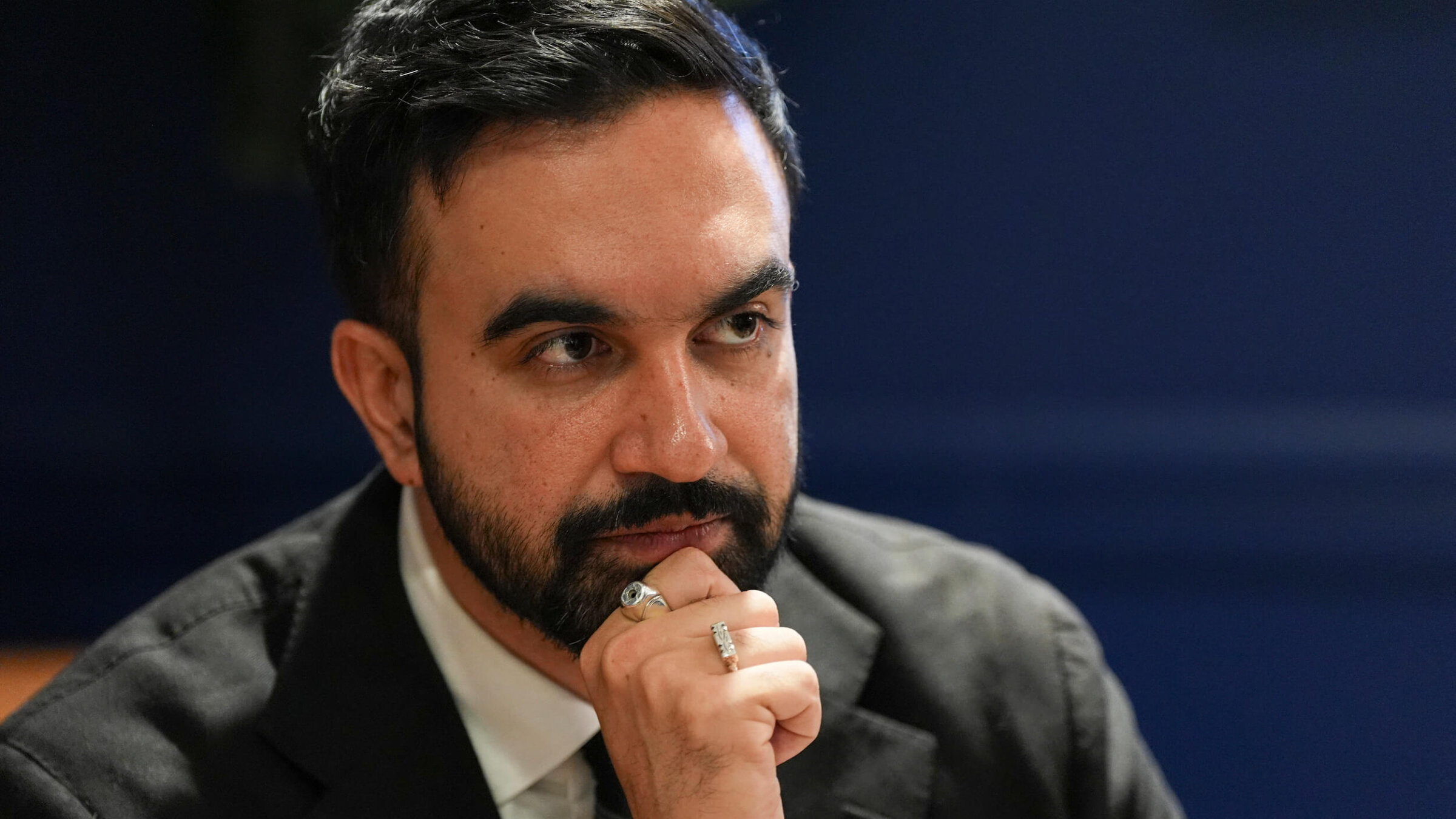Why I don’t trust Zohran Mamdani to fight left-wing antisemitism
Voters should be wary of Mamdani’s promise to fight anti-Jewish hate — because it’s not clear he’ll recognize it

New York Democratic mayoral candidate Zohran Mamdani on Oct. 16. Photo by Angelina Katsanis / Pool / AFP / Getty Images
Zohran Mamdani wants New York City’s Jews to believe he can protect them from antisemitism.
It’s easy to take Mamdani, the Democratic candidate for mayor and current frontrunner in the race, at his word when it comes to right-wing antisemitism. Progressives like him tend to have little difficulty calling out white supremacy, Holocaust denial or far-right conspiracy theories.
But what will happen when New York’s Jews face antisemitism coming from the left?
Left-wing antisemitism — which is almost always entangled with anti-Zionism — can be more difficult to recognize than its right-wing counterpart. It often targets Jews or Jewish institutions under the guise of protesting Israel, including blacklisting Zionist therapists, banning Zionists from appearing at bookstores and accusing organizations like Hillel of supporting genocide.
Which raises the question: Given Mamdani’s lifelong pro-Palestinian activism, can Jews rely on him to recognize when anti-Zionism crosses the line into antisemitism?
Based on his record of double-talk when it comes to Israel, there are serious reasons to be skeptical. While Mamdani’s beliefs about Middle East foreign policy aren’t directly relevant to his suitability to be mayor of New York City, his beliefs about Israel will affect his readiness to identify left-wing antisemitism — and that will affect Jewish New Yorkers.
During a recent Fox News interview, when asked if Hamas should “lay down its arms,” Mamdani refused to answer. “I don’t really have opinions on Hamas and Israel beyond the question of justice and safety,” he responded.
At the mayoral debate days later, he backpedaled and said that “of course” Hamas should disarm.
Mamdani did not explain his initial refusal to call out Hamas, a recognized terrorist organization with genocidal aims against the Jewish state. He acted as if he was merely clarifying his position, not changing it.
During a June podcast interview, Mamdani was evasive when asked about the phrase “globalize the intifada,” a popular pro-Palestinian chant, which some see as calling for violence against Jews. He sidestepped a request to condemn it weeks later during a Meet the Press interview. In July, he finally said he would “discourage” the phrase’s use, a meek response to a bare-minimum ask — that language inciting antisemitic violence be outright rejected.
Both of these cases ought to have been easy wins for Mamdani. He could have shown his ability to discern when rhetoric and ideas related to Israel can come across as threatening to Jews.
Full-throatedly calling for Hamas’ disarmament, and condemning the phrase “globalize the intifada,” would not have compromised Mamdani’s commitment to the Palestinian cause, which is served neither by Hamas — which is notoriously brutal against Palestinian civilians — nor Western protesters who parrot its rhetoric. And it would have gone a long way toward reassuring Jews that their potential future mayor understands and empathizes with their concerns.
Other examples of Mamdani’s waffling reinforce his unreliability in this department.
Mamdani has decried those whom he describes as “progressive except Palestine,” but also insists he will have Zionists in his administration. Which leaves Jewish voters wondering: Which of those apparently opposed positions should they believe represents his actual intention?
His campaign has reassured New York Jews that he will not defund the annual Israel Day Parade. However, if he already supports the Boycott, Divestment and Sanctions movement, why would he permit a parade celebrating a country he views as broadly violating human rights and, in Gaza, committing genocide? Yes, every politician adjusts their promises to resonate with the electorate they’re courting, but this degree of inconsistency in this one, focused area still provides reasons to be anxious.
Mamdani has made good-faith efforts to engage with Jews from across the spectrum, in Haredi communities and liberal ones alike. But he’s yet to show that he’s able to meaningfully grow in his views either on the Middle East or on how its politics touch the lives of his potential future constituents. Zionism is closely intertwined with the identities of the vast majority of American Jews. And failing to respond to the threat that anti-Zionism can pose to Jewish lives could be a grave mistake.
After all, as the editorial board of The New York Times has noted, “the demonizing, delegitimizing rhetoric of the left” on Israel “bears some responsibility” for deadly antisemitic attacks in Boulder, Colorado, and Washington, D.C., this past year.
However, recognizing when anti-Israel rhetoric becomes antisemitic can come at a cost for progressives.
Last year, the Democratic Socialists of America withdrew support from Rep. Alexandria Ocasio-Cortez for participating in a panel on antisemitism. Their rejection of the congresswoman for even acknowledging the rise in antisemitism following the Hamas attack of Oct. 7, 2023, came despite the fact that she is among Israel’s fiercest critics.
As a proud progressive like Ocasio-Cortez, Mamdani, who is aligned with the Democratic Socialists of America, could face serious backlash if he confronts left-wing versions of antisemitism — yet another reason to question his ability to do so.
All this is frightening for Jewish New Yorkers. In a moment of historic spikes in antisemitism, New York’s Jews need a mayor who understands their fears and will not hesitate to confront them. Without that, how can they be expected to feel safe in New York City?














